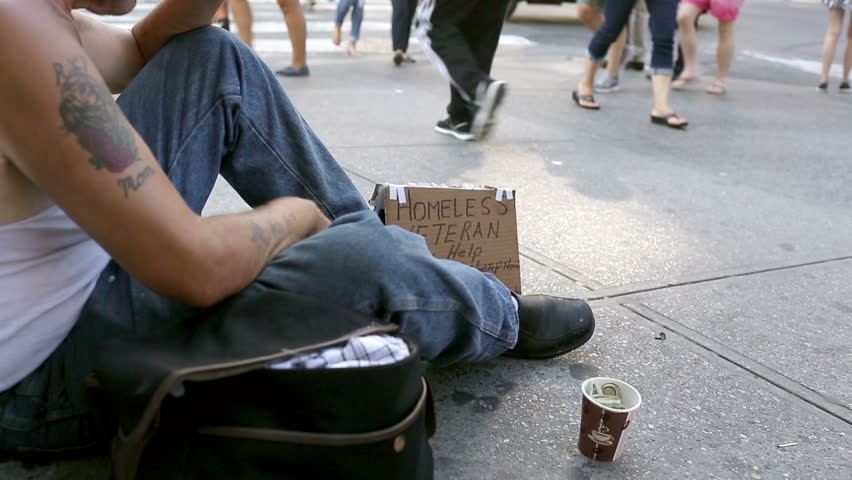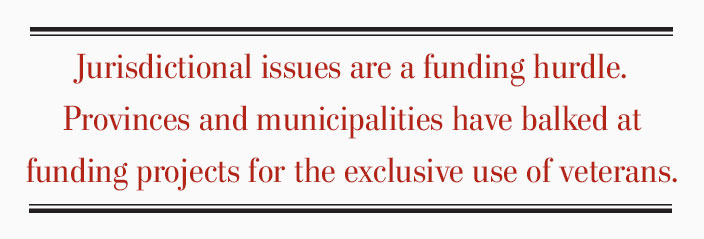Ending veterans’ homelessness requires a co-ordinated national plan, targeted funding for housing projects, a rent supplement—and involvement of the Legion.
“The Royal Canadian Legion, with its nationwide network, is simply irreplaceable in terms of translating national objectives to the local level,” said the federal Standing Committee on Veterans Affairs chaired by MP Neil Ellis in its May report, Moving Towards Ending Homelessness Among Veterans.
Veterans’ homelessness is not an insurmountable problem, but it is a complex jurisdictional one, requiring a co-ordinated approach between federal, provincial and municipal governments and the many aid organizations helping the estimated 3,000 to 5,000 homeless veterans across the country.
Although there are many paths to homelessness, it begins for many with difficulty adapting to the civilian world, particularly coping with negative events without the social support network provided by military life.
Civilian homeless shelters do not offer the stable housing and continuing support veterans need to rebuild their lives, and many homeless veterans shun them.
Many organizations offer emergency help for homeless veterans. VETS Canada identifies homeless veterans across the country and refers them to appropriate local services. The Legion’s Leave the Streets Behind program, launched by Ontario Command, has spread across the country in the past decade and has helped hundreds of veterans. Veterans Affairs Canada has an emergency fund, transition programs and mental-health services.
While shelters offer emergency aid, “if that’s all we’re offering, it’s facilitating homelessness,” Matthew Pearce, president of Montreal’s Old Brewery Mission, said to the committee.
“The real solution to getting people off the street is to shift the focus from shelters to long-term housing,” said the report.
Four organizations, including Cockrell House in Vancouver and the Multifaith Housing Initiative in Ottawa, are developing a Canadian model for housing and support of homeless veterans, featuring longer-term transitional housing with built-in social support.
Veterans are one of 11 groups cited as vulnerable, priority populations in the National Housing Strategy, which will provide $20.5 billion over 12 years, cost-matched by provinces and territories.
However, jurisdictional issues are a funding hurdle. Provinces and municipalities have balked at funding projects for the exclusive use of veterans. Some have turned down funding requests, saying veterans’ housing is a federal responsibility. But that funding is necessary to qualify for federal funds. Despite qualifying for federal land on which to build a 40-veteran facility, much volunteer support and many partnerships with other agencies, the Multifaith Housing Initiative was turned down for provincial and municipal funding and had to undertake a $5-million fundraising campaign, Suzanne Le, executive director, told the committee.
A plan that addresses this jurisdictional wrangle is needed.
And although VAC said in 2016 it is working on a strategy to prevent and end homelessness, “To date we have seen no sign of progress,” Ray McInnis, the Legion’s director of Veterans Services, told the committee.
The report’s recommendations include that:
• VAC work with community groups to keep continual contact with veterans at risk, with the aim of preventing homelessness;
• VAC support research, particularly into overrepresentation of women and indigenous veterans in the homeless population;
• RCMP veterans be eligible for the VAC emergency funds;
• VAC work with Canada Mortgage and Housing Corp. to ensure targeted funding for homeless veterans under the National Housing Strategy;
• The federal government create a rent supplement for homeless veterans;
• All levels of government and veterans’ advocacy groups work together to implement action plans such as the National Housing Strategy.
Advertisement














